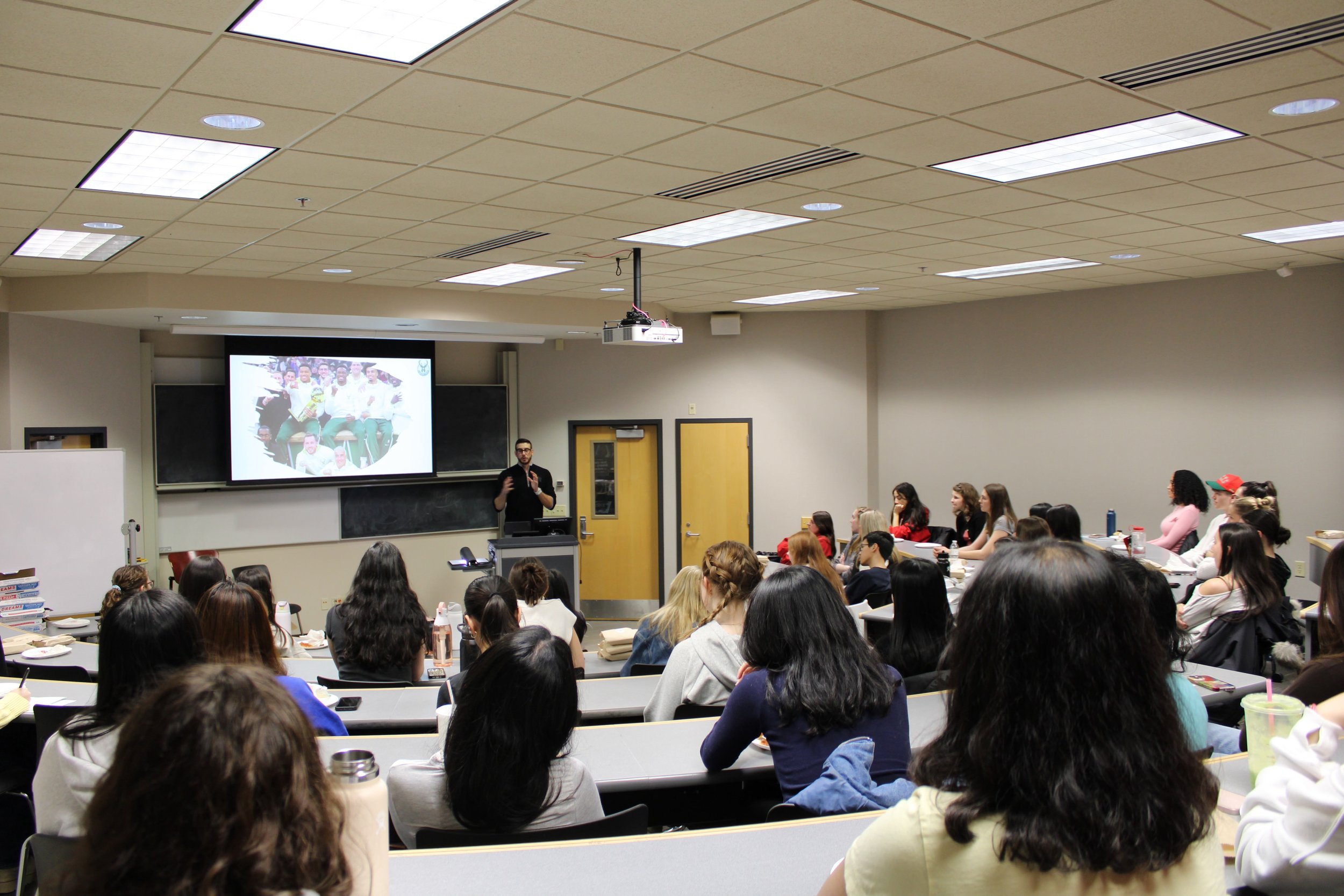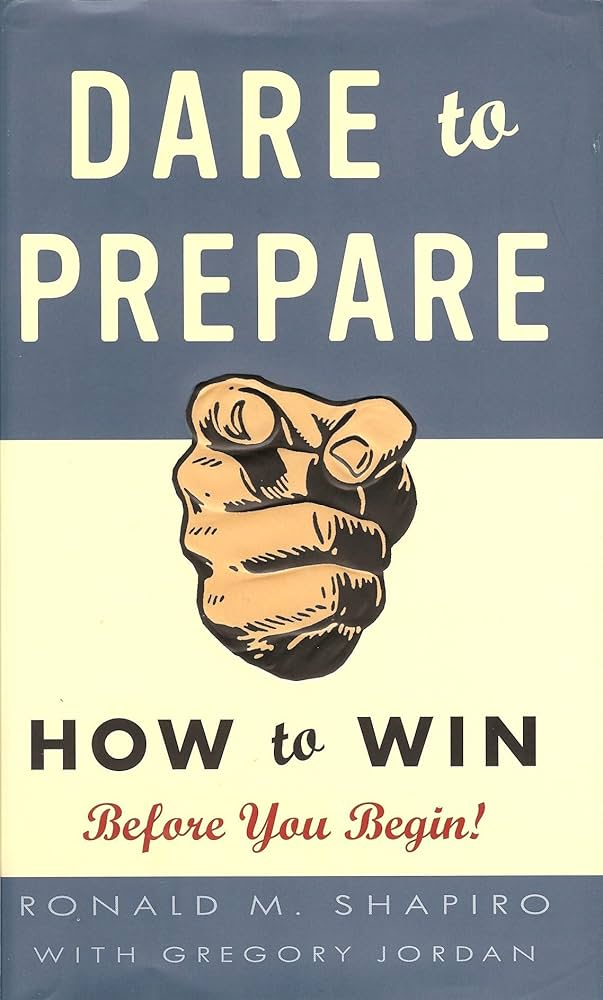
The Vault x Samer Jassar
Analytics and Strategy with the Milwaukee Bucks
Written by Jordan Landretti
On Tuesday, March 18th, 2025, The Vault held a speaker event with Samer Jassar, the Director of Basketball Strategy and Analytics for the Milwaukee Bucks. Jassar started out by giving background on his personal life leading up to his career journey. He grew up in Israel and came to the United States to play basketball. He had played basketball for around fifteen years, which inspired his decision in college to pursue a career related to sports.
He landed an internship working for sports agent Ronald Shapiro, who Jassar initially described as a baseball agent but realized during his time at the company that Shapiro represented more than just baseball. Jassar remarked that he was inspired by all he learned from Shapiro, and he credits the start of his career to this internship experience. Shapiro taught him all about negotiating, which is a lesson he still uses today. Shapiro also has written lots of inspiring literature works such as Dare to Prepare: How to Win Before You Begin and The Power of Nice. Jassar highlighted some quotes from Shapiro, such as “Control what you can control” and “much is lost for the want of asking” in reference to what advice has stuck with him throughout his career. He learned that it was up to him to make a name for himself and started reaching out to different sports teams to jumpstart his career.
Once Jassar graduated from college in 2013, he reached out to over 20 different sports teams. Hedidn’t hear back from any of them, which Jassar said was really discouraging. He leaned into his mentor, Shapiro, who asked Jassar the question: “why would someone hire you?” He questioned what made him different and thought about what skills he could learn to achieve his goals, a lesson he believes everyone should take away. From there, he started reaching out to people in entry-level roles and asked those same questions. He took note that many of them had a unique skill set or relationship that helped them stand out. Jassar realized he didn’t have any of those, so he began to network and build a skill set and work ethic. He started networking at the NBA summer league and just started being a “pest”. He emailed and asked to meet with people, which ended up paying off. Jassar never gave up, focusing on getting his MBA and networking to learn more about open positions and what more he could do to stand out. He ended up working with the Minnesota Timberwolves for a couple of years, but he continued to network and go to events to meet other people. He learned that he had strong skills in negotiating, which he leveraged to make himself stand out.
This persistent networking landed him his current role at the Milwaukee Bucks after spending time at fundraisers and other events talking with people and working his way up. At his current job, Jassar is required to analyze data and report it back to coaches and executives for the Milwaukee Bucks to aid in many decisions for the team. He states that he typically will write a script to keep the executives on task and move forward with negotiations. As Shapiro says, “You outperform them when you out prepare them,” and Jassar notes that preparation is power. He will make lists of everything he needs to get done daily to make sure he is prepared and to manage his time wisely. As Jassar looks back, he learned that he was not always good at prioritizing his time. Work ended up being so time-consuming because he loved it so much. Today, he keeps better track of his to-do lists and emphasizes the necessity of good time management.
Jassar then gave a lecture on what analytics actually is, which is a key part of his job. He defined it as problem-solving and a mix of math and data. The data is used to predict and better understand unsolved or unforeseen problems and find solutions to current and future problems. Analytics is all about choosing the right problem that will have the most impact–the key to identifying the right problem. For example, he uses analytics to solve an issue with how players are doing on the court when the Bucks are losing. The data may show that there is not enough pressure with the ball or from the offense, so he will give suggestions for small adjustments that can be made to improve. Typically Jassar will give pre-game and post-game reports but provide coaches with the data they need during a game. He also deals with injured players and with trades, for which analytics are a very useful tool. Jassar then described other key parts of his job such as strategy. He stressed the importance of building a plan to achieve goals and objectives, determining key performance indicators and the why, the how and the what. He uses all of these tactics in the meetings he has on a daily basis. The structure of his job is very process-oriented, following a cycle of analyzing, creating objectives, debating and evaluation in a never-ending cycle. Jassar mentions that there are challenges within each area of the process but found that when he negotiates, he always prepares by asking himself what he wants to achieve, any alternatives and the highest and lowest goals he can attain from a deal. Before answering the audience’s questions, he left off by saying that when he’s hiring, he looks for work ethic, detail-oriented candidates and ideal availability. He has to work all year round in the sports industry because there may be suspensions or injuries, which makes good availability in a candidate vital. Overall, showing that you have a strong work ethic and pay attention to details will help you stand out in any job. Jassar also recommends networking.
Q&A Highlight Summary:
Q: Do you make personal relationships with players and does it make it hard to make decisions?
A: Jassar said yes, because it is unavoidable. He keeps it professional and does what is best for the team.
Q: How do you transform data into something digestible to present, and what is the biggest challenge faced by data scientists?
A: Jassar said that visualization is key, as he mostly works with coaches and his job is to summarize the data from the data scientist. He will give the coaches a one-page summary of what the result of the data is and what it is saying. This includes a full summary page and three high-level summary (which are 3 bullet points) to not overwhelm the coaches.
Q: What is the best life lesson you’ve learned overcoming an issue early in your career?
A: Jassar said that speaking without thinking seems smarter. He mentioned that he misspoke in front of a group of people once, which led him to learn to be comfortable saying “I don’t know.” He believes it is best to be less quick to give the answer and give it a thought instead. Jassar also learned time management after being burnt out for a couple of months because he was so excited to work and forgot to prioritize time to himself. He created a work-life balance by dedicating time for each project and knowing how to prioritize it. He creates a to-do list every single night.
Q: What is the most fulfilling part of your job?
A: Jassar said winning the NBA championship in 2021. He loves what he does and it doesn’t feel like it is a job.
Q: What role does analytics play during game times?
A: Jassar said that it is preimposed, so he doesn't give advice during the games because that is a coach's job. There are 20 cameras on during the game that show data that Jassar uses to give advice when relevant after the game. During playoffs, he suggests adjustments for things such as lineups, rotations and more in a pre- or post-game report.
Q: Have you ever encountered a time when analytics was wrong?
A: Jassar said that the data is never wrong, it just might not be answering the right question. There is more that goes into problem-solving such as from the eyes (see on court), ears (hear from player how he is with his relationships—locker room respect), and numbers (they don’t always match what you are seeing). For example, he saw a younger player who had a great shot but didn’t make it every time. The data would say that he is a bad player, but this wasn’t true. There is more beyond data.
Q: Do you and your analytics team think that you will use AI to enhance data and the decision-making process?
A: Jassar said he had a recent conference in Boston about how to use AI to make their jobs easier and more efficient. He learned it should be used in processes but not in decisions. Using AI to ask questions to understand analytics will be game-changing for his industry.
Q: Do you consider public feedback in decisions for the team?
A: Jassar said it has a small impact, but he focuses on making his strategies on data. The PR department will look over his decisions and consider public feedback.
Q: A lot of NBA teams employ analytics; what does your team do differently?
A: Jassar said that the head of research innovation comes from the baseball industry, which brings a different perspective on how to view data. The other teams only know basketball.
Q: Do you think the job has changed how you make decisions in your daily life?
A: Jassar says that it has and now he is more strategic in big life decisions, negotiates and bargains. He is very intentional with what he does and focuses on making educated decisions.
Q: If you were to give yourself a piece of advice in the beginning, what would that be?
A: Jassar said that he would tell himself to be patient because everyone has a different timeline. It is easy to get frustrated, but it’s good to just be patient. He stressed the importance of networking.
Q: How do you network?
A: Jassar said to get out of your comfort zone. It doesn’t have to be events; it can be a cold text, email or call. It can be hard, but send it out. Jassar’s mom told him “if you know what you want, go get it.” Jassar notes that doors will open up if you know what you are trying to accomplish when reaching out. Be prepared when talking with them and be intentional. Be patient and comfortable with being uncomfortable.
Q: What are some tips for negotiating?
A: Jassar said to not make the first offer, but that the most important thing is to know or understand the goal. Determine the highest and lowest you are willing to go, and be willing to walk away. No deal is better than a bad deal, and you do not have to take a bad deal. Jassar is not in the business of doing bad deals. Sometimes, he is forced to make the first deal, but he notes to make sure to avoid this. Understand what the market is and set limits.
Q: What is being considered when trading a player?
A: Jassar said that most people are looking at it from a fan standpoint. However, 99% of decisions are made if trade works mechanically. This includes financial impacts, objective changes moving forward, what all these changes are in the short- and long-term, how this player fits in the locker room and on the court and more. He makes around 1,000 calls to executives and players on the team. His job involves constant communication with the team before the trade is public knowledge. It is the hardest thing to do, since the public doesn’t see the work or emotion that goes into it, just the final call.
Q: If you use data and analytics to make a decision and underperform, where does the blame go?
A: Jassar said that the data is not wrong, but there can be other factors as to why a decision did not work out. For example, they had a player they traded for that underperformed. It turned out that his wife was pregnant, and his mind was not fully on the game. Jassar tries his best to get as much information as possible to anticipate other factors like adjustments to the city, family relationships, and the player’s personal life. Data cannot see these personal factors. He notes that not every decision will be good, but it minimizes risks by having a Plan B. He thinks ahead about what would happen if this doesn’t work out, and configures what the next move is. It is less about blame and more about how to solve the problem when this occurs.
Q: You oversee the people who create analytics, and how do you manage everyone?
A: Jassar said he has to understand that everyone has a different and unique skill set and personality. He finds out what they are passionate about, and he knows he cannot treat everyone the same. This helps make the job easier.
Thank you to Samer Jassar for your insightful presentation and for answering all of our questions!
Edited by Olivia Ruetten and Simran Khanuja




